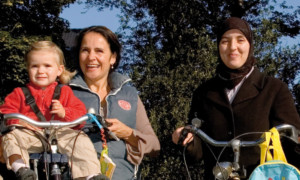Cycling / Cycling Education
Empowering women with cycling
 Although the Netherlands is a world-renowned cycling country, not everyone living here knows how to ride a bike. Many people move to the Netherlands from parts of the world where cycling is far from the norm.
Although the Netherlands is a world-renowned cycling country, not everyone living here knows how to ride a bike. Many people move to the Netherlands from parts of the world where cycling is far from the norm.
To tackle this, once a week in parks, community centres and car parks throughout the Netherlands, groups of ten or so women get together to learn how to cycle. These cycling lessons seemed interesting way to examine what role the bicycle plays in integrating people into Dutch society. I began attending lessons in the city of Utrecht to explore issues of mobility, gender and citizenship as research for my master’s thesis.
Before starting the research, I took a course to become a cycle teacher. This allowed me to get to know the students I taught and help them learn how to ride. I witnessed first-hand the students struggles and jubilation, the falls and frustrations, and the sheer fun of riding a bike!
More than cycling
Over the weeks, I began to realise that the lessons were teaching much more than just cycling. The students got the chance to practise their Dutch by working with the teachers. National holidays, such as Kings Day and Liberation day, interrupted the lessons schedule which meant the students learned about the country’s traditions and history.
However, it was not only the pupils that did the learning – the cycling teachers learned about the students too. I encountered teachers who had picked up Arabic words. Due to Ramadan, some students stopped attending so we, the teachers, learned about how people spend this religious holiday. I found the lessons to be sites of important cross-cultural exchanges where both the cycle teachers and their students can learn about one another.
One student, who I will call Farah, had lived in the Netherlands for 16 years after leaving her home country of Egypt. Farah told me how the lessons had taught her more than just cycling: “I am less afraid to speak more Dutch, which I didn’t used to be. I was always shy.” Towards the end of the ten-week course, Farah arrived at the lesson with her brand-new bike. I remember her standing beside it proudly as the other students huddled around inspecting it’s every detail. Farah pointed out the rear paniers which from now on would be carrying her shopping. The next week Farah arrived with news – she had cycled to her Dutch lesson on the other side of the city by herself. Just seven weeks ago I watched her struggle to cycle, hesitantly searching with her foot for the bikes pedal, while the front wheel twitched as she tried to keep her balance. Now, she was out in the city by herself!
Challenging stereotypes
Bikes are about freedom. Once you can cycle you don’t have to rely on public transport, departing when the timetable decides. You can go further than your feet will carry you. It gives you a new independence. American women’s rights activist Susan B. Anthony knew this back in 1896, stating that: “the bike has done more to emancipate women than any one thing in the world.” Women’s rights movements in the UK and USA saw the bike as an embodiment of the freedom they were fighting for. My research found that bikes continue to give women independence and confront stereotypical assumptions.
A majority of the women I encountered were from north Africa and the Middle East. Many wore headscarves and veils, which were visible signs of their faith. Certain voices in the Netherlands claim that these women are oppressed by a religion that forces them to cover up and dress in a certain way, painting them as victims without agency. Some claim that teachings of Islam are incompatible with Dutch values. When you ride a bike you are in charge, you decide when and where you’re going. A woman in a headscarf riding a bike is symbolic: it shows that her cultural background and the values of the Netherlands are compatible, they are not in opposition.
These just some of my findings from my research on cycling lessons in the Netherlands. What the research revealed most of all: bikes can change people’s lives!
This piece is based on an article I wrote for journal Lova. If you are interested in reading more, you can find the article in full here.

